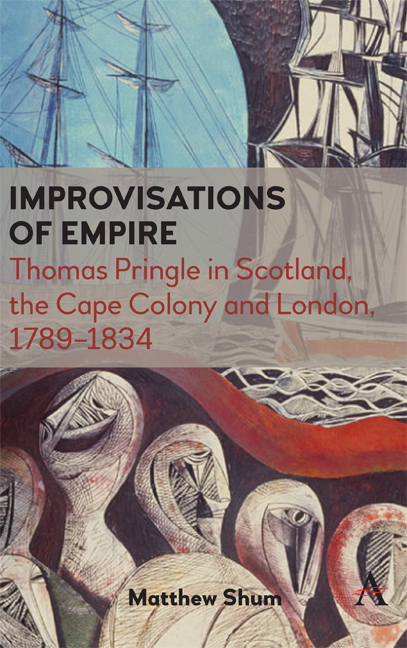Summary
In the canon of South African literature in English, Thomas Pringle has occupied a privileged place, both as the producer of the first substantial body of literary, journalistic and reportorial work about this country, and as an exemplary figure for the liberal values of press freedom and racial tolerance. In this combination of the ethical and the aesthetic, Pringle is commonly considered a crucial writer around whom “the core foundational myths of South African liberalism have been constructed” (Dubow 2006, 27). Yet scant critical attention has been paid to the diffractions of circumstance that attended the production of Pringle's work or the motivations for his public actions. Pringle's life and writings, particularly his poetry, are the product of a complex conjoining of different contexts. As the title of this study indicates, Pringle must be located within, and among, three national or geographical spaces, all of which exerted an intermingled influence on his imagination. Although Pringle may be regarded as central to the lineages of South African liberalism, it should also be recognized that he was a person in transit between different national spaces and also between different sets of formative influences. This mutability registers in the poetry, in particular, which moves from an absorption in the Scottish antiquarian revival and Scottish and English Romanticisms to a poetry of public address that draws retrospectively on eighteenth-century models. Pringle's Narrative of a Residence in South Africa, published for the first time in African Sketches (1834), a volume that brought together the poetry and a significant section of Pringle's prose, exhibits a similarly diverse range of concerns and motivations, particularly in its final chapters that are heavily invested in the surge of political events that lead to the abolition of colonial slavery in 1833– 34. A considerable proportion of Pringle's South African writing was produced when he lived in London (1826– 34), where his public profile was, paradoxically, more substantial than it ever had been in Scotland or South Africa. Even so, Pringle wrote from within a kind of double expatriation, and these mixed junctures give his work an intriguing angularity that sets him apart from his metropolitan counterparts.
- Type
- Chapter
- Information
- Improvisations of EmpireThomas Pringle in Scotland, the Cape Colony and London, 1789–1834, pp. 1 - 8Publisher: Anthem PressPrint publication year: 2020



